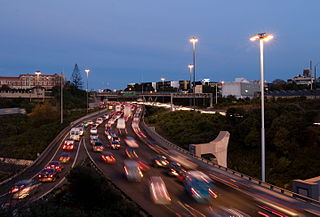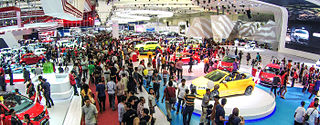
Škoda Auto a.s., often shortened to Škoda, is a Czech automobile manufacturer established in 1925 as the successor to Laurin & Klement and headquartered in Mladá Boleslav, Czech Republic. Škoda Works became state owned in 1948. After 1991, it was gradually privatized to the German Volkswagen Group, becoming a partial subsidiary in 1994 and a wholly owned subsidiary in 2000.

Toyota Motor Corporation is a Japanese multinational automotive manufacturer headquartered in Toyota City, Aichi, Japan. It was founded by Kiichiro Toyoda and incorporated on August 28, 1937. Toyota is one of the largest automobile manufacturers in the world, producing about 10 million vehicles per year.

Daihatsu Motor Co., Ltd., commonly known as Daihatsu, is a Japanese automobile manufacturer and one of the oldest surviving Japanese internal combustion engine manufacturers. The company's headquarters are located in Ikeda, Osaka Prefecture.
Toyota Motor North America (TMNA) is the operating subsidiary that oversees all operations of the Toyota Motor Corporation in Canada, Mexico, and the United States. Its operations include research and development, manufacturing, sales, marketing, after sales and corporate functions, which are controlled by TMNA but sometimes executed by other subsidiaries and holding companies. The company is headquartered in Plano, Texas, with offices in several locations including Georgetown, Kentucky, Ann Arbor, Michigan, Washington, D.C., and New York City.

Toyota New Zealand Limited is the importer and distributor of new Toyota and Lexus vehicles to New Zealand. It also imports used vehicles from Japan and refurbishes them at its former assembly plant in Thames.

Australian Motor Industries (AMI) was an automobile assembly firm that was significant in the early history of the automotive industry in Australia.
UMW Toyota Motor Sdn. Bhd. (UMWT) is the appointed Toyota distributor, assembler and exporter of Toyota vehicles in Malaysia. The company was founded in October 1982 as Sejati Motor, prior to being renamed UMW Toyota Motor in October 1987.

The history of Toyota started in 1933 with the company being a division of Toyoda Automatic Loom Works devoted to the production of cars under the direction of the founder's son, Kiichiro Toyoda. Kiichiro Toyoda had traveled to Europe and the United States in 1929 to investigate automobile production and had begun researching gasoline-powered engines in 1930. Toyoda Automatic Loom Works was encouraged to develop automobile production by the Japanese government, which needed domestic vehicle production, due to the war with China. Kiichiro Toyoda seized this opportunity to establish the Automotive Production Division on September 1, 1933, and began preparing to build prototype vehicles. In 1934, the division produced its first Type A Engine, which was used in the first Model A1 passenger car in May 1935 and the G1 truck in August 1935. Production of the Model AA passenger car started in 1936. Early vehicles bear a striking resemblance to the Dodge Power Wagon and 1930's Chevrolet, with some parts actually interchanging with their American originals.

Škoda Auto Volkswagen India Private Limited is the wholly owned Indian subsidiary of German automotive manufacturing company Volkswagen Group.

A substantial car industry was created in Australia in the 20th century through the opening of Australian plants by international manufacturers. The first major carmaker was Ford Australia and the first Australian-designed mass production car was manufactured by Holden in 1948. Australian manufacture of cars rose to a maximum of almost half a million in the 1970s and still exceeded 400,000 in 2004. Australia was best known for the design and production of 'large' sized passenger vehicles. By 2009 total production had fallen to around 175,000 and the Australian market was dominated by cars imported from Asia and Europe.
This article provides an overview of the automotive industry in countries around the world.

The Cooper Motor Corporation, also known as CMC Motors Group Limited, is the fifth-largest importer of vehicles and fifth-largest car-assembly company in Kenya, the largest economy in the East African Community.

The automotive industry in New Zealand supplies a market which has always had one of the world's highest car ownership ratios. The distributors of new cars are essentially the former owners of the assembly businesses. At the dealership level they have maintained their old retail chains in spite of the establishment of the many new independent businesses built since the 1980s by specialists in used imports from Japan. Toyota entered into direct competition with those used-import businesses refurbishing old Toyotas from Japan and selling them through their own dealers as a special line. The nation's car fleet is accordingly somewhat older than in most developed countries.
The automotive industry in Ireland has had a varied history, the punitive tax on imported cars encouraged a wide range of companies to assemble their cars locally including Fiat, Ford and Renault. From Ireland's entry to the European Union in 1973, the need for locally produced cars to avoid import taxes reduced and since the 1980s, production ended and all cars are now imported.

The automotive industry in Indonesia plays an important role to the economic growth of the nation, contributing 10.16 percent of the GDP. Indonesia automotive product exports is currently higher in value than their imports. In 2017, Indonesia is the 17th largest passenger vehicle producer in the world and the 5th largest passenger vehicle producer in Asia, producing 0.98 million vehicles.

As of 2019, the automotive industry in Thailand is the largest in Southeast Asia and the 10th largest in the world. The Thai industry has an annual output of more than two million vehicles, more than countries such as Belgium, Canada, the United Kingdom, Italy, Czech Republic and Turkey.

The automotive industry in Vietnam is a fast-growing sector mainly reliant on domestic sales. All currently produced models are designed abroad by foreign brands, and many rely on knock-down kit production. Due to a high import taxes on automobiles, the Vietnamese government protects domestic manufacturing. Although Vietnam is a member of the ASEAN Free Trade Area, automobile imports fall under an exception. Since January 1, 2018, the 30% import tax has been discontinued as part of ASEAN agreements. Currently, the Vietnamese motor industry is not deemed competitive enough to make exports feasible. As of April 2018, 85% of car sales in Vietnam were produced domestically from CKD kits.

Toyota South Africa Motors (Proprietary) Limited (TSAM) is an automobile manufacturer that is a subsidiary of Toyota based in Prospecton, South Africa.

The automotive industry in the Philippines is the 9th largest in the Asia-Pacific region, with approximately 273.4 thousand vehicles sold in 2019. Most of the vehicles sold and built in the Philippines are from foreign brands. For the most part, the Philippines is dominated by Japanese automobile manufacturers like most of its ASEAN neighbors. The automobile production in the country is covered under the Philippine Motor Vehicle Development Program implemented by the Board of Investments. In addition, there are also a small number of independent firms who assemble and fabricate jeepneys and other similar vehicles, using surplus engines and drivetrain parts mostly from Japan.














